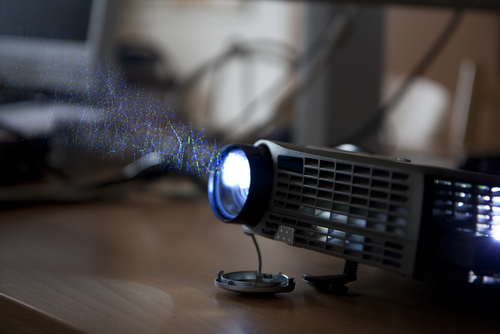Projector serves as one of the best mediums for entertainment, and it offers three different display technology choices to its user to create an image. Even though there is some other display option but DLP, LCD and LCoS are the most technologies used by every manufacturer. Projector buyer’s guide & list of best projectors under 1000 billlentis, Explains everything in detail.
Now, let’s take a look at all these technologies;
DLP
Digital light processing technology or commonly known as DLP, it is one of the most common and cost-effective projection technologies available in the market. The superior quality DLP models offer along with vibrant color, deep black, and high contrast ratio makes it one of the most popular choices among movie enthusiasts.
This technology is created by the famous Texas Instruments, and the popularity of the model has never gone down. Basically, it is a group of thousands of tiny mirrors clustered into a DMD chip, and each represents a pixel.
These group of mirrors tilt in to and fro motion and deflect light according to the given the video source and ultimately create an image on the screen. It uses a color wheel to create deep color in the picture which serve as the perk of owning a DLP home theater model.
However, when it comes to brightness, it lacks in lumens number. The cost of making single DLP chips is quite low; thus, most of the models are quite budget friendly and offer best-in-class visuals at a low price. With that being said, you will be delighted to know that even some of the best short throw projector also utilizes DLP so that they can offer better quality at good price. Apart from the single chip, there are also three-chip DLP models, and the quality they provide is far better than many LCoS models, but they are highly expensive.
LCD
LCD or liquid crystal display is another popular display technology that is predominant in different price ranges. It utilizes three liquid crystal panels which is basically like a prism, and each panel radiates one of the primary colors (red, blue or green) which ultimately help in creating an image.
When the primary color come out from the prism, then they converged together and finally projected on the screen. The operation process is simple, but the overall image output is mindboggling. The electrical signal this display technology receives helps it activate pixel amount depending upon the resolution of the projector.
LCD projectors are known for their prolific color performance, and they offer better color shade and variation than DLP models. This technology provides a balanced color performance thus enabling it to avoid burning the smooth definition of an image.
Moreover, they also high contrast ratio and brightness level and this is the reason they are widely used in home theater projectors. Many LCD projectors are light in weight, and because of this, they are becoming a popular choice in the portable department. Currently, some manufacturers are using new optics enhances in LCD projectors to minimize pixelization which ultimately notches up the image quality.
LCoS
LCoS (liquid crystal on a silicon water) on the other hand is considered as the cinema-grade display technology, and they are mostly available in high-end projectors. It is a combination of the finest DLP and LCD technology, so it is reflective as DLP and block lights like LCD at the same time.
The image creation process is not very complicated, but it utilizes many expensive parts. The pixel density of LCoS models is quite high, and the pixel restriction is quite less when compared with DLP and LCD which results in high resolution.
LCoS sits at the pinnacle position in terms of image output quality because it doesn’t face flickering, screen door effect, ghosting or rainbow effect. The quality it produces is almost similar to high-end LED TV or movie-theater, and only a few manufacturers uses it produce projectors.
Sony terms LCoS as SXRD technology whereas JVC terms it as D-ILA technology. Even though it excels in most of the department but it fails to deliver optimum brightness or motion-blur free visuals.


